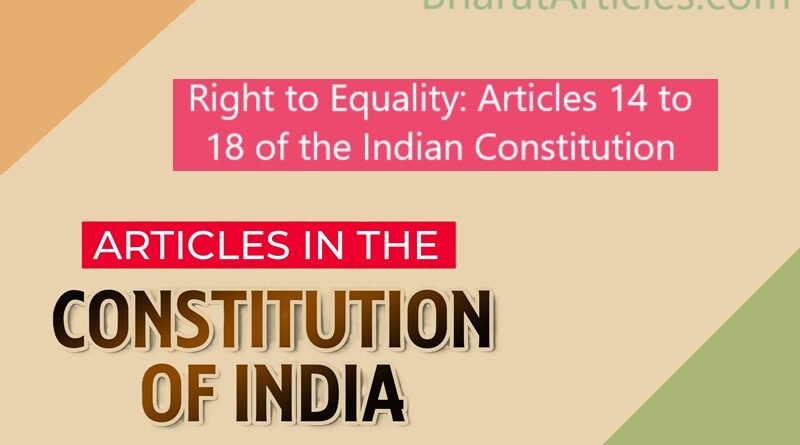Right to Equality: Articles 14 to 18 of the Indian Constitution
The Right to Equality is a fundamental right guaranteed under Part III of the Indian Constitution. Enshrined in Articles 14 to 18, this right seeks to ensure that all individuals are treated equally before the law and prohibits discrimination on various grounds. It is a cornerstone of India’s democratic framework and reflects the values of justice, liberty, and equality.
Article 14: Equality Before Law and Equal Protection of Laws
Article 14 guarantees two key principles:
- Equality Before Law: This means that no person is above the law, and everyone is subject to the same legal provisions regardless of their status.
- Equal Protection of Laws: This ensures that all individuals in similar circumstances are treated equally by the law.
Judicial Interpretation:
- In E.P. Royappa v. State of Tamil Nadu (1974), the Supreme Court stated that equality is a dynamic concept aimed at achieving fairness and justice.
- In Maneka Gandhi v. Union of India (1978), the Court expanded the scope of Article 14 to include non-arbitrariness, emphasizing that state actions must be fair, just, and reasonable.
Article 15: Prohibition of Discrimination
Article 15 prohibits discrimination by the state against any citizen on grounds of religion, race, caste, sex, or place of birth.
Key Provisions:
- No Discrimination: The state cannot discriminate against any citizen based on the above grounds.
- Special Provisions: However, the state can make special provisions for:
- Women and children.
- Socially and educationally backward classes, Scheduled Castes (SCs), and Scheduled Tribes (STs).
Landmark Cases:
- State of Madras v. Champakam Dorairajan (1951): The Supreme Court ruled that reservations must comply with Article 15.
- Indra Sawhney v. Union of India (1992): Upheld the validity of reservations for Other Backward Classes (OBCs) under Article 15(4).
Article 16: Equality of Opportunity in Public Employment
Article 16 provides for equality of opportunity in matters of public employment.
Key Provisions:
- No Discrimination: All citizens are entitled to equal opportunity in public employment.
- Reservation: The state can provide reservations for:
- Scheduled Castes, Scheduled Tribes, and Other Backward Classes.
- Residents of a particular area for certain jobs.
Exceptions:
- Certain offices related to religious or denominational institutions may be reserved for members of that religion.
Landmark Cases:
- M. Nagaraj v. Union of India (2006): Upheld the validity of reservations in promotions but emphasized the need for quantifiable data.
- Jarnail Singh v. Lachhmi Narain Gupta (2018): Stressed the need for revisiting the criteria for reservations.
Article 17: Abolition of Untouchability
Article 17 abolishes the practice of untouchability in all forms and makes its practice a punishable offense.
Key Provisions:
- Complete Prohibition: The practice of untouchability is forbidden under any circumstances.
- Legal Enforcement: The Parliament enacted the Protection of Civil Rights Act, 1955, to enforce this provision.
Judicial Interpretation:
- State of Karnataka v. Appa Balu Ingale (1993): The Court emphasized the need for stringent measures to eradicate untouchability.
Article 18: Abolition of Titles
Article 18 prohibits the state from conferring titles except for military or academic distinctions.
Key Provisions:
- No Hereditary Titles: Titles such as “Maharaja” or “Raja” were abolished to promote equality.
- Foreign Titles: Indian citizens are prohibited from accepting titles from foreign states without the President’s consent.
Exceptions:
- Military and academic titles, such as “Major” or “Doctor,” are allowed.
Judicial Interpretation:
- Balaji Raghavan v. Union of India (1996): The Court upheld the validity of awards like Bharat Ratna, clarifying that they do not violate Article 18 as long as they are not used as titles.
Significance of the Right to Equality
The Right to Equality under Articles 14 to 18 ensures the elimination of social inequalities and promotes justice. It empowers individuals by:
- Upholding the Rule of Law: Ensures that all citizens are equal in the eyes of the law.
- Promoting Social Justice: Targets caste-based and gender-based inequalities.
- Enhancing Opportunities: Provides a level playing field in employment and education.
- Strengthening Democracy: By ensuring equal rights, it upholds the principles of democratic governance.
Challenges and Criticisms
- Implementation Issues: Despite legal provisions, social discrimination persists in various forms.
- Reservation Debates: Controversies surrounding the reservation system often lead to political and social tensions.
- Economic Inequalities: The focus on caste and social categories sometimes overlooks economic disparities.
Read This: Landmark Judgments in India
Conclusion
The Right to Equality is a fundamental pillar of India’s democratic structure. Articles 14 to 18 collectively aim to create a society free from discrimination, untouchability, and inequality. While significant progress has been made, continuous efforts are required to address the challenges and ensure the full realization of these constitutional ideals.

